Today, efforts from key actors in American history are undermined by recent changes in immigration policy. With women’s history month and black history month in mind, this post honors contributions made by both groups by reviewing the intersectional practice of public diplomacy, how it has transformed with the help of digital advances, and how the new administration can employ these tactics to help improve national security and foreign relations.
Jazz Diplomacy
In 1954, President Eisenhower put a new spin on cultural exchange meant to patch relations between the U.S. and foreign countries. “Jazz diplomacy” sent a team of black Americans overseas to improve Muslim youth’s cultural awareness of American music through various musical and cultural acts. The performers engaged with Muslim youth in order to educate them about American culture and motivate them to study in the U.S. They ultimately strived to portray the U.S. in a more favorable light while educating their audience about foreign policy.
The team interacted with foreign audiences to show how America was moving towards inclusion of different races, challenging the perception of black Americans as victims of racism. There were sentiments back then, and still reflected today, that black Americans were denied participation in diplomatic efforts due to rampant discriminatory practices. The effort to include black Americans in public diplomacy marked significant progress for a group that was stripped of citizenship by a Supreme Court ruling just a century before. Once ‘stateless’ beings, unable to travel or make name for themselves in the U.S., black American citizens now had a chance to represent their country to the world. This eventually opened doors to black women as well, with Patricia Roberts Harris being the first appointed with the title of Ambassador in 1965. Harris and Ruth A. Davis, a career diplomat, became trailblazers in their field as women and as African-Americans in high-ranked positions.
This movement and others like it demonstrated the benefit of holding meetings beyond the official closed-doors ones. The State Department broadened their strategy to include cultural display and exchanges within this sphere. This opened up more doors for engagement and room for more casual and open dialogue between state actors.
What is public diplomacy?
Public diplomacy is the communication between domestic governments and foreign public in order to inform or influence. Though often misunderstood due to its undefined and disputed relationship with propaganda, public diplomacy aims to build a secure global environment by fostering trust and cementing relationships between nations.
Past administrations saw public diplomacy evolve over time, usually in line with a major event such as Sept. 11, but also to reflect developments in communications technology. For instance, the Carter administration saw the U.S. Information Agency, the agency housing public diplomacy programs, renamed as the U.S. International Communications Agency for a brief period of time when the Bureau of Educational Cultural Affairs was added on, introducing new broadcasting technology to both. Past administrations have used tactics such as international broadcasting, Twitter Q&As, and the facilitation of technology training session as part of their public diplomacy campaigns.
This naturally led to the improvement of public diplomacy programs. Digital tools cut costs and allowed the U.S. to counter disinformation online and provide key facts about its foreign policy goals. Obama was the first president to expand America’s digital presence in a cohesive manner. His new policies and professional use of Twitter, Instagram, and Facebook allowed foreign and domestic audiences to see a more open and transparent cyberspace. Obama’s digital savvy was mirrored in the State Department’s programs and tactics.
Honoring the legacy
With the recent transition of power from Obama to Trump, both foreign and domestic audiences alike are unsure whether the U.S. will continue improving on its open governance initiatives. This week, President Trump renewed his push for banning residents of Syria, Iran, Libya, Somalia, Sudan and Yemen from entering the U.S. The revised order exempts current visa and green card holders, excludes Iraq from the list of banned countries, and removed language construed as discriminatory on the basis of religion. Unfortunately, this agenda continues to alienate citizens of countries deemed a threat to the U.S. on little evidence, and may still violate laws that ensure due process for visa applicants. Though Trump holds some promise with his grasp of Twitter usage, how will he take public diplomacy programs, established over decades in order to curb fears, combat extremism, and build relationships, and put them to good use?
Luckily, the State Department already has several initiatives in place meant to combat extremism on the ground level. Public diplomacy or government to foreign citizen programs at the State Department such as International Information Programs or the Global Engagement Center, has been working to combat grassroots level extremism with its digital presence and technology training programs. International Information Programs’ Share America platform, their Speakers program, and their American Spaces initiative were all produced to engage foreign youth and key grassroots organizations in meaningful dialogue, while also reducing the risk of violent extremism overseas and abroad.
The Trump administration would do well to consider using public diplomacy to improve the United States’ relations with other countries, especially those that have experienced violent extremism. Communications tools have been steadily advancing since that first deployment of black Americans overseas, and how these tools are wielded can make or break the ties that past diplomats and presidents sought to mend or strengthen. As diplomat-in-chief of the U.S., the president must reflect the efforts of black people who have served their country through public diplomacy.
The Brookings Institution is committed to quality, independence, and impact.
We are supported by a diverse array of funders. In line with our values and policies, each Brookings publication represents the sole views of its author(s).


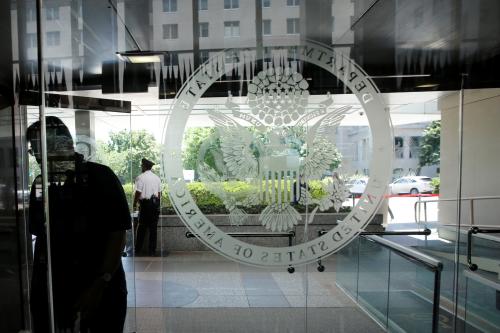
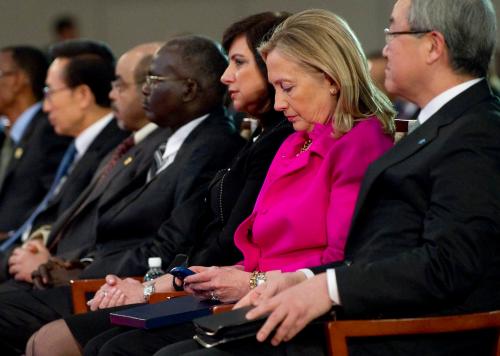
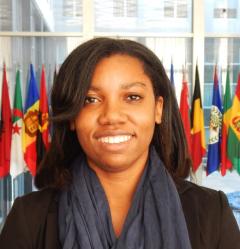

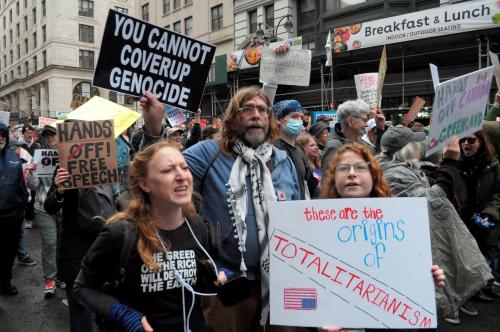

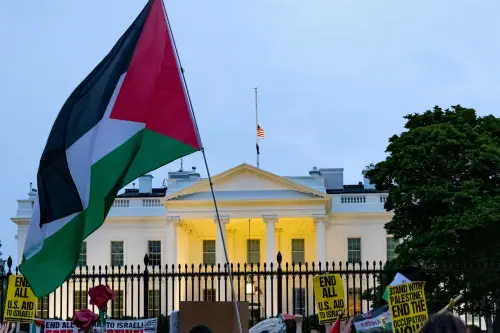
Commentary
Immigration ban ignores public diplomacy’s legacy of inclusion and innovation
March 10, 2017